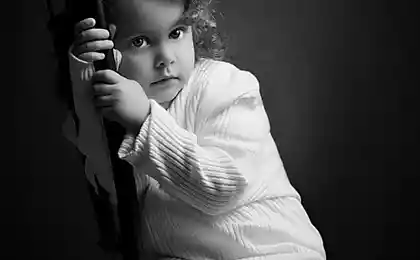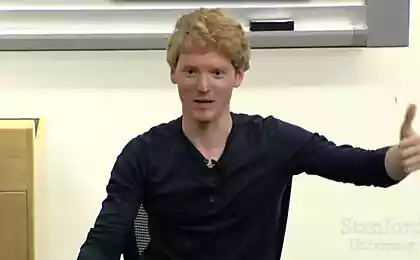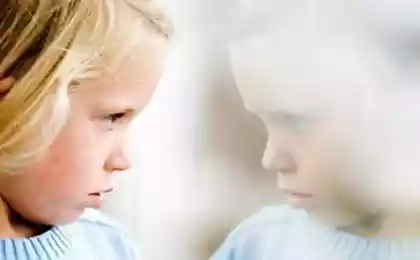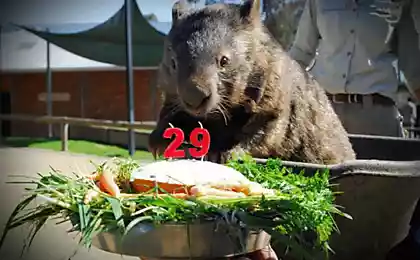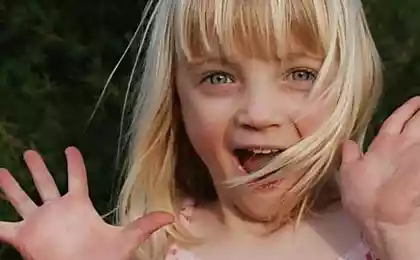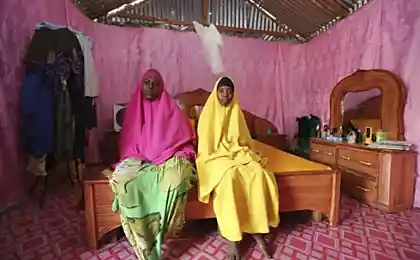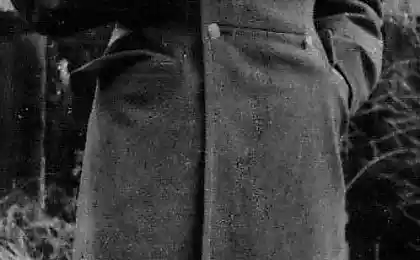562
Patrick Casement about the monsters that live inside us
Briefly about the monsters that live inside us and a member of the British psychoanalytic society Patrick Casement about the birth of baby hatred, what needs are behind this feeling, and how the inability to "containerevent" children's destructive emotions can lead to the formation of a tyrant.
We are all at different points in his life experiencing anger, hatred and rage. But the first time we open its destructiveness in childhood, when all of a sudden we are bombarded by an outbreak of rabies and we begin to hate someone stopping us to get what you want.
In many ways, this situation is crucial, because on its outcome and the reaction of the mother depends on many things: whether we will be able to cope with the monster, which suddenly opened his whether we will help the adult in this difficult matter or make concessions, thus giving us to understand that he is powerless against the inner monster that was loose, and we need to stay with him one on one, in the end, what will our meaningless victory?
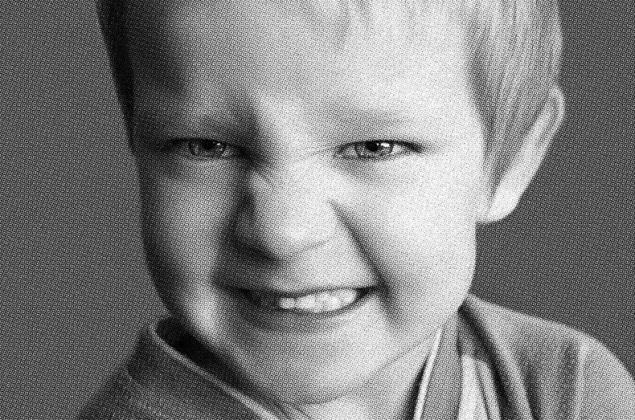
As the researchers note, in this situation, extremely important is the ability of the mother or another significant adult "to containerevent" the child's feelings, i.e. "digest" them, to pass through itself and to return him acceptable to him, thereby helping him to cope with uncontrolled passions. Inability to containerevent can lead to very sad consequences — from the banal theft of the child before the formation of uncontrolled tyrant, who without the support of adults failed to defeat the monster in himself and released it outside.
What the child feels who has discovered a hatred how to help him and what can cause pointless photocatalyst and inability to set limits, says a well-known psychoanalyst and supervisor Patrick Casement in his lecture "Hatred and kontynuowana".
The meaning of containerware in when the other accepts your feelings, without responding them directly from their emotions, and since he has (as expected) the ability to containerevent their own, that can help you to understand your. In childhood we need to discover that there are significant others, especially parents, are able to cope with what we ourselves still can not cope. Among these things are our anger, our destructiveness, and our hatred. If our parents are not able to provide such kontynuowana, we probably will try to find it in others. But if we don't find we need containerbase and others, we will most likely grow up with the belief that we have something that is too much for anyone.
Hatred and kontynuowana
Hatred
Usually hate call some kind of intense dislike. Hatred can be for the most part rational, such as when we hate a stranger invading a family home and it collapsed. She can be completely irrational when a child hates spinach for color. It can be quite challenging when brings us someone we trusted — then we can also hate yourself for letting yourself be fooled by someone who has not earned trust.
We are all capable of hate. And duration of this hatred may vary from short bursts to long periods that can last a lifetime and even over generations. Instant flash of hatred is experiencing, for example, a child who failed to succeed. For a long period of hatred a person can experience to the opponent, who is perceived as a threat to significant relationships. And there is one constant and usually irrational hatred some people have for certain groups of people or to a particular nation or race. We may hate some people for what they are too similar to us, because they distract from us when we want to be considered unique. Similarly, we can hate other people because they are different from us, and their manners and customs seem strange to us, contrary to our understanding of how to live or behave. In particular we may hate some people because we see in them that you don't want to see in ourselves.
Containerevent
In childhood we need to discover that there are significant others, especially parents, are able to cope with what we ourselves still can not cope. Among these things are our anger, our destructiveness, and our hatred. If our parents are not able to provide such kontynuowana, we probably will try to find it in others. But if we don't find we need containerbase and others, we will most likely grow up with the belief that we have something that is too much for anyone.
If the child is unable to find other adequate and reliable containerbase, its development could go one of two ways.
One is that the child begins to spiral out of control, and becomes harder to deal with it. It is an unconscious search for a lasting containerbase that has not yet been found, containerbase, which would be finally enough to handle the kid with nobody, apparently, couldn't consult. It is kontynuowana, still looking for others. The psychotherapist believes that a child is still unconsciously hoping that he would find what he needed.
Other effects are observed when the child begins to develop a false Self, because he felt that he alone should be responsible for kontynuowana than the rest, apparently, to deal not. The "false Self" in this case, a mask for others, which sometimes develops an insecure child and by which he is able to hide the true thoughts and feelings. In the natural course of things, his behaviour would have deteriorated, but it becomes flexible, aims to please, so that it is unnaturally good.
Children of this type, apparently, have lost hope to find in others what they feel the deepest need. Such a child may begin to fear that parents will not survive, if not to protect them constantly from that in himself which he feels will be for them too. Then the child in your soul "cares" about the parents that only looks like it would take care of him.
Hatred and its relationship to containerpanel
We are all capable of hate. Children are also capable of hate, and often their hatred is much more specific and unconditional than most adults. Children are prone to fluctuations between absolute love and absolute hatred. We adults can safely call it "ambivalence". But the child can not calm about this.
Often a small child feels the need to keep these States of mind in isolation from each other because they simply can not cope with the conflict of such opposite feelings in relation to one and the same person. A lot depends on how it is understood and how the perceived hatred of the child. Mother one of the hardest things is to find that baby hates her, treats her like she was a bad mother, whereas in fact she is struggling to be a good mother.
For example, when the child insists on his own, he needs to find a parent who knows when to say "no." But a child who has not received the required, often falls into a frenzy, trying to break the solid resistance of the parent. The parent can not stand the shouts and screams to give in and the child will get what insists.
A common problem with these outbreak of "rabies" is included in that often the child tries to cause their turmoil from parentI to increase the chances of getting what you want. At such moments, the mother may need all her confidence to maintain the love for a child, especially when she was feeling negative response indicates a lack of love. It should be noted that the temptation for a mother to give way to outbursts of irritation of the child is often motivated by its desire to show and feel your love as deep inside it can move an unconscious desire to drown out the feeling of hatred in yourself or the baby.
When parents or caregivers are too easily yield to the rage of the child, for it is "meaningless victory". Such children may again and again to resort to the insistence on their to get "proof" of love.
But it's proof of nothing since it can't replace the feeling of really deep love, the love of a parent, he can take aim at him with hatred. Often the finding of this hardness and containerware, the ability of the parent to set the limits, and directed unconsciously bouts of irritation of the child and other forms of bad behavior.
Unfortunately, finding the necessary containerbase, the child can develop a growing sense of what in his behavior, apparently, is something the parent is not able to cope. Instead accept and help to containerwith that could become as uncontrollable "monster" in the child, the parent is sometimes like trying to "buy off" ceding to the demands of the child.
Such a child is deprived of a deeper sense of parental loveand the sense of security which is provided by strong but caring containerpanel. Then the child may feel that inside like there really is something bad, as in his anger or hatred, which is too much even for a parent who is not able to cope with it.
Theory
<...>, Psychotherapist noted that the child deprived of something important for the sense of security and growth, and deprived of this for too long, it may seek the missing component symbolically, by stealing someone else looks forward to its attainment.
The most important thing in these various forms is fraught with violations of behavior — to find someone who would recognize in them the unconscious search; who could match what the Psychotherapist calls the "moment of hope". He thus implies that the child needs to find someone who could recognize the unconscious search, which is expressed in its bad behavior, the unconscious hope that this behavior will be understood and there will be someone capable to meet the expressed it needs.
If the moment of hope resonates, focuses on the needs expressed in poor and even evil behavior, and it may gradually become unnecessary. This happens because the child begins to find kontynuowana, which was lacking and which he unconsciously was looking for.
However, if the moment of hope does not resonate, it can be expected that bad (predelinquent) behavior will intensify and cause more problems. Unconscious search will go beyond family and cover other people. However, it can happen that a child in predelinquent condition will begin to punish the world outside the family and home for the deaf to his needs.
The psychotherapist reminds us that the growing child and especially a teenager, needs a confrontation with a parent or other adult: "Confrontation is part of containerbase no shades of punishment and retribution, but with its own strength." He also warns us that if parents give in to these needs of the growing child, he or she can gain a false maturity. The teenager in this way is likely to be not Mature adults, and a tyrant, expecting that all would he yield.
The psychotherapist describes as a child, fantasizing, could "destroy" the object in his mind. His need in this case is the ability of an external object (that is, the real parents or real analysis) to survive such a destruction without destruction or vengeance. Then it will be found that the outer object (i.e. the parent or analyst) has its own force, and not only that which, by fantasy, he was "given" a child or patient, protecting him from all that for him too and that he supposedly could not stand it.
Bion speaks of the feeling of the child that he was dying. Child it is imperative to let the fear of the mother, and under the influence of such distress, the mother may experience a sense of something uncontrollable. However, if the mother is able to make this impact and to understand what she reported and why, there is a possibility that the child will receive his fortune of fear back, but it will be manageable due to the ability of the mother to cope with him herself. Bion describing the failure of containerbase says: "If the projection is not accepted by the mother, the infant feels that its feeling that it dies, loses its sense. Then the child reintroduire, but not fear of dying, became portable, and the nameless dread" <...>.
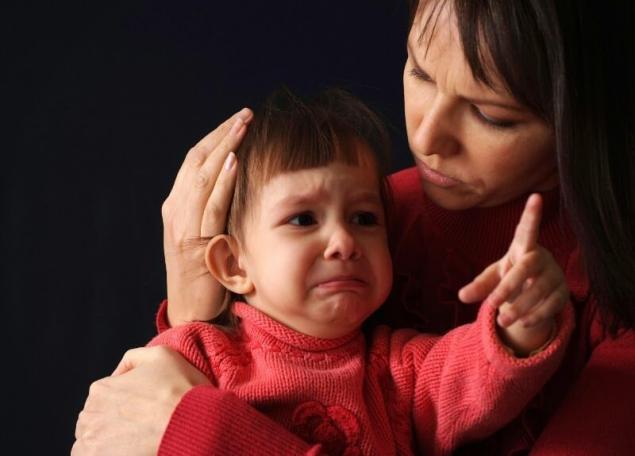
Clinical example
<...> The girl Joey had two brothers, older and younger, and no sisters. By the time the first meeting she was 7 years old. I learned from sending her analyst that her mother was very difficult to accept the fact that her daughter was born, she openly adored her sons, but in relation to joy was both cold and aloof.
I also heard that the mother couldn't stand when joy made her feel self-hatred, showing his hatred towards her. So she instead set the limits and to withstand the rage, following her attempt to tell your daughter "no", condoned joy. In the result, Joey was allowed to do whatever she wanted and get what she wanted. Therefore, joy was truly a "spoiled child".
Not surprisingly, in the course of my work with her, joy had subjected me to very severe tests and has become very demanding. When I said No, she was angry. She was angry, sometimes so much so that he started kicking me or trying to bite me or scratch.
Fortunately, her mother allowed me to behave strictly with joy, so she was ready to hear the cries of joy, sometimes coming from my office. Then there were a few occasions when I had to keep raging joy, until she calmed down.
I found that I can take joy in such a way that she can't kick, scratch or bite me. At such moments, she began to shout: "let go, Let go!". Each time I calmly said, "I don't think you're ready to hold back myself, so I'm going to hold you until you're ready to restrain themselves."
In these cases, and there were several during the first months of my studies with her joy every time shouted "let go, Let go", but from time to time less decisively. Then I started telling her, "I Think you've probably ready to restrain herself, but if not, again I'll hold you to that".
7 unforgivable mistakes education
19 simply brilliant tips for parents
After that Joey has calmed down, and whenever it happened, she then cooperated and began to do some work. This was repeated several times, and Joey showed that began to take with me the safety of a new type.
That would not seem in itself beyond the control of the "monster" which could not handle her mother, she felt I could handle it. Thus she was able to learn something from my containment, which helped her to restrain herself. Her look at him began to change, and with it has changed her behavior.published
P. S. And remember, only by changing their consumption — together we change the world! ©
Source: monocler.ru/nenavist-i-konteynirovanie/
We are all at different points in his life experiencing anger, hatred and rage. But the first time we open its destructiveness in childhood, when all of a sudden we are bombarded by an outbreak of rabies and we begin to hate someone stopping us to get what you want.
In many ways, this situation is crucial, because on its outcome and the reaction of the mother depends on many things: whether we will be able to cope with the monster, which suddenly opened his whether we will help the adult in this difficult matter or make concessions, thus giving us to understand that he is powerless against the inner monster that was loose, and we need to stay with him one on one, in the end, what will our meaningless victory?

As the researchers note, in this situation, extremely important is the ability of the mother or another significant adult "to containerevent" the child's feelings, i.e. "digest" them, to pass through itself and to return him acceptable to him, thereby helping him to cope with uncontrolled passions. Inability to containerevent can lead to very sad consequences — from the banal theft of the child before the formation of uncontrolled tyrant, who without the support of adults failed to defeat the monster in himself and released it outside.
What the child feels who has discovered a hatred how to help him and what can cause pointless photocatalyst and inability to set limits, says a well-known psychoanalyst and supervisor Patrick Casement in his lecture "Hatred and kontynuowana".
The meaning of containerware in when the other accepts your feelings, without responding them directly from their emotions, and since he has (as expected) the ability to containerevent their own, that can help you to understand your. In childhood we need to discover that there are significant others, especially parents, are able to cope with what we ourselves still can not cope. Among these things are our anger, our destructiveness, and our hatred. If our parents are not able to provide such kontynuowana, we probably will try to find it in others. But if we don't find we need containerbase and others, we will most likely grow up with the belief that we have something that is too much for anyone.
Hatred and kontynuowana
Hatred
Usually hate call some kind of intense dislike. Hatred can be for the most part rational, such as when we hate a stranger invading a family home and it collapsed. She can be completely irrational when a child hates spinach for color. It can be quite challenging when brings us someone we trusted — then we can also hate yourself for letting yourself be fooled by someone who has not earned trust.
We are all capable of hate. And duration of this hatred may vary from short bursts to long periods that can last a lifetime and even over generations. Instant flash of hatred is experiencing, for example, a child who failed to succeed. For a long period of hatred a person can experience to the opponent, who is perceived as a threat to significant relationships. And there is one constant and usually irrational hatred some people have for certain groups of people or to a particular nation or race. We may hate some people for what they are too similar to us, because they distract from us when we want to be considered unique. Similarly, we can hate other people because they are different from us, and their manners and customs seem strange to us, contrary to our understanding of how to live or behave. In particular we may hate some people because we see in them that you don't want to see in ourselves.
Containerevent
In childhood we need to discover that there are significant others, especially parents, are able to cope with what we ourselves still can not cope. Among these things are our anger, our destructiveness, and our hatred. If our parents are not able to provide such kontynuowana, we probably will try to find it in others. But if we don't find we need containerbase and others, we will most likely grow up with the belief that we have something that is too much for anyone.
If the child is unable to find other adequate and reliable containerbase, its development could go one of two ways.
One is that the child begins to spiral out of control, and becomes harder to deal with it. It is an unconscious search for a lasting containerbase that has not yet been found, containerbase, which would be finally enough to handle the kid with nobody, apparently, couldn't consult. It is kontynuowana, still looking for others. The psychotherapist believes that a child is still unconsciously hoping that he would find what he needed.
Other effects are observed when the child begins to develop a false Self, because he felt that he alone should be responsible for kontynuowana than the rest, apparently, to deal not. The "false Self" in this case, a mask for others, which sometimes develops an insecure child and by which he is able to hide the true thoughts and feelings. In the natural course of things, his behaviour would have deteriorated, but it becomes flexible, aims to please, so that it is unnaturally good.
Children of this type, apparently, have lost hope to find in others what they feel the deepest need. Such a child may begin to fear that parents will not survive, if not to protect them constantly from that in himself which he feels will be for them too. Then the child in your soul "cares" about the parents that only looks like it would take care of him.
Hatred and its relationship to containerpanel
We are all capable of hate. Children are also capable of hate, and often their hatred is much more specific and unconditional than most adults. Children are prone to fluctuations between absolute love and absolute hatred. We adults can safely call it "ambivalence". But the child can not calm about this.
Often a small child feels the need to keep these States of mind in isolation from each other because they simply can not cope with the conflict of such opposite feelings in relation to one and the same person. A lot depends on how it is understood and how the perceived hatred of the child. Mother one of the hardest things is to find that baby hates her, treats her like she was a bad mother, whereas in fact she is struggling to be a good mother.
For example, when the child insists on his own, he needs to find a parent who knows when to say "no." But a child who has not received the required, often falls into a frenzy, trying to break the solid resistance of the parent. The parent can not stand the shouts and screams to give in and the child will get what insists.
A common problem with these outbreak of "rabies" is included in that often the child tries to cause their turmoil from parentI to increase the chances of getting what you want. At such moments, the mother may need all her confidence to maintain the love for a child, especially when she was feeling negative response indicates a lack of love. It should be noted that the temptation for a mother to give way to outbursts of irritation of the child is often motivated by its desire to show and feel your love as deep inside it can move an unconscious desire to drown out the feeling of hatred in yourself or the baby.
When parents or caregivers are too easily yield to the rage of the child, for it is "meaningless victory". Such children may again and again to resort to the insistence on their to get "proof" of love.
But it's proof of nothing since it can't replace the feeling of really deep love, the love of a parent, he can take aim at him with hatred. Often the finding of this hardness and containerware, the ability of the parent to set the limits, and directed unconsciously bouts of irritation of the child and other forms of bad behavior.
Unfortunately, finding the necessary containerbase, the child can develop a growing sense of what in his behavior, apparently, is something the parent is not able to cope. Instead accept and help to containerwith that could become as uncontrollable "monster" in the child, the parent is sometimes like trying to "buy off" ceding to the demands of the child.
Such a child is deprived of a deeper sense of parental loveand the sense of security which is provided by strong but caring containerpanel. Then the child may feel that inside like there really is something bad, as in his anger or hatred, which is too much even for a parent who is not able to cope with it.
Theory
<...>, Psychotherapist noted that the child deprived of something important for the sense of security and growth, and deprived of this for too long, it may seek the missing component symbolically, by stealing someone else looks forward to its attainment.
The most important thing in these various forms is fraught with violations of behavior — to find someone who would recognize in them the unconscious search; who could match what the Psychotherapist calls the "moment of hope". He thus implies that the child needs to find someone who could recognize the unconscious search, which is expressed in its bad behavior, the unconscious hope that this behavior will be understood and there will be someone capable to meet the expressed it needs.
If the moment of hope resonates, focuses on the needs expressed in poor and even evil behavior, and it may gradually become unnecessary. This happens because the child begins to find kontynuowana, which was lacking and which he unconsciously was looking for.
However, if the moment of hope does not resonate, it can be expected that bad (predelinquent) behavior will intensify and cause more problems. Unconscious search will go beyond family and cover other people. However, it can happen that a child in predelinquent condition will begin to punish the world outside the family and home for the deaf to his needs.
The psychotherapist reminds us that the growing child and especially a teenager, needs a confrontation with a parent or other adult: "Confrontation is part of containerbase no shades of punishment and retribution, but with its own strength." He also warns us that if parents give in to these needs of the growing child, he or she can gain a false maturity. The teenager in this way is likely to be not Mature adults, and a tyrant, expecting that all would he yield.
The psychotherapist describes as a child, fantasizing, could "destroy" the object in his mind. His need in this case is the ability of an external object (that is, the real parents or real analysis) to survive such a destruction without destruction or vengeance. Then it will be found that the outer object (i.e. the parent or analyst) has its own force, and not only that which, by fantasy, he was "given" a child or patient, protecting him from all that for him too and that he supposedly could not stand it.
Bion speaks of the feeling of the child that he was dying. Child it is imperative to let the fear of the mother, and under the influence of such distress, the mother may experience a sense of something uncontrollable. However, if the mother is able to make this impact and to understand what she reported and why, there is a possibility that the child will receive his fortune of fear back, but it will be manageable due to the ability of the mother to cope with him herself. Bion describing the failure of containerbase says: "If the projection is not accepted by the mother, the infant feels that its feeling that it dies, loses its sense. Then the child reintroduire, but not fear of dying, became portable, and the nameless dread" <...>.

Clinical example
<...> The girl Joey had two brothers, older and younger, and no sisters. By the time the first meeting she was 7 years old. I learned from sending her analyst that her mother was very difficult to accept the fact that her daughter was born, she openly adored her sons, but in relation to joy was both cold and aloof.
I also heard that the mother couldn't stand when joy made her feel self-hatred, showing his hatred towards her. So she instead set the limits and to withstand the rage, following her attempt to tell your daughter "no", condoned joy. In the result, Joey was allowed to do whatever she wanted and get what she wanted. Therefore, joy was truly a "spoiled child".
Not surprisingly, in the course of my work with her, joy had subjected me to very severe tests and has become very demanding. When I said No, she was angry. She was angry, sometimes so much so that he started kicking me or trying to bite me or scratch.
Fortunately, her mother allowed me to behave strictly with joy, so she was ready to hear the cries of joy, sometimes coming from my office. Then there were a few occasions when I had to keep raging joy, until she calmed down.
I found that I can take joy in such a way that she can't kick, scratch or bite me. At such moments, she began to shout: "let go, Let go!". Each time I calmly said, "I don't think you're ready to hold back myself, so I'm going to hold you until you're ready to restrain themselves."
In these cases, and there were several during the first months of my studies with her joy every time shouted "let go, Let go", but from time to time less decisively. Then I started telling her, "I Think you've probably ready to restrain herself, but if not, again I'll hold you to that".
7 unforgivable mistakes education
19 simply brilliant tips for parents
After that Joey has calmed down, and whenever it happened, she then cooperated and began to do some work. This was repeated several times, and Joey showed that began to take with me the safety of a new type.
That would not seem in itself beyond the control of the "monster" which could not handle her mother, she felt I could handle it. Thus she was able to learn something from my containment, which helped her to restrain herself. Her look at him began to change, and with it has changed her behavior.published
P. S. And remember, only by changing their consumption — together we change the world! ©
Source: monocler.ru/nenavist-i-konteynirovanie/






